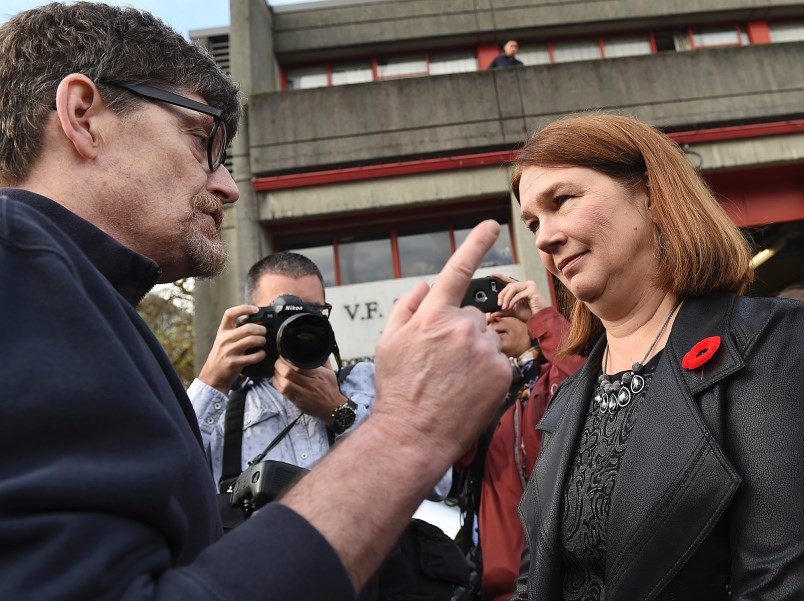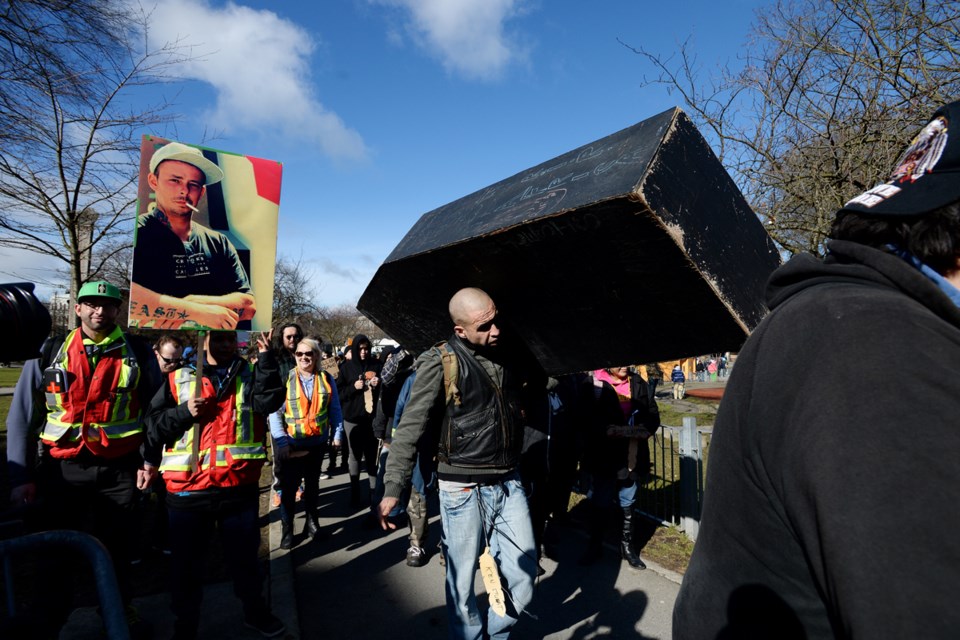The federal health minister says she is working “every single day” to combat the overdose drug death crisis that has hit British Columbia and other parts of the country but recognizes why hundreds of people took to the streets Tuesday in a nation-wide protest aimed at politicians to do more.
Jane Philpott described the protests in Vancouver, Toronto, Montreal and other cities as “a good thing” and that such action draws attention to an issue that she said must have all levels of government, health professionals and drug users collaborating on solutions.
“I encourage people to collaborate and to realize that we are here, and I am always listening and I am working on this every single day,” Philpott told the Courier by telephone Tuesday, prior to a crowd of about 300 people marching through the Downtown Eastside. “It totally breaks my heart what’s happening and I feel the weight of this in a way that I hope people may or may not acknowledge. But believe me, I will do everything in my authority to see this turned around as rapidly as possible. But I cannot do it alone.”
The nation-wide protest Tuesday was aimed at all three levels of government, with organizers saying politicians need to create more solutions to prevent people from dying, including legalizing and regulating all drugs. A total of 914 people died of an overdose in B.C. last year, with the latest statistics showing 116 lives were lost in January.
Last Friday, Philpott was in Vancouver to announce that B.C. will receive $10 million to continue fighting the opioid overdose crisis. The minister also announced another $65 million will be spent Canada-wide over the next five years on the opioid crisis.

Philpott pointed out her ministry has introduced several measures to combat the crisis, including making the overdose-reversing drug naloxone available without prescription, overturning a ban on prescription heroin for certain drug users and creating legislation to make it easier for cities to open supervised injection sites.
Still, the message in the streets of the Downtown Eastside from protesters, including organizer Jordan Westfall, is that all drugs should be legalized and regulated – a position taken in 2011 by the Health Officers Council of B.C., including Dr. Patricia Daly, chief medical health officer for Vancouver Coastal Health. Westfall is the president of the Canadian Association of People Who Use Drugs.
“We know what will end this epidemic – drug decriminalization, full legalization and regulation of prohibited substances, access to injectable opioids, safe unadulterated drugs, a place where people can use them -- and support from our government to make sure that we have the ability to advocate for ourselves and for our human rights,” Westfall told a crowd gathered at Oppenheimer Park.
Westfall and others advocates, including members of the Vancouver Area Network of Drug Users and Western Aboriginal Harm Reduction Society, marched from Oppenheimer Park to the Health Canada offices near Granville Street and then returned to the park, where participants hanged wooden feathers in the trees in remembrance of the 914 lives lost last year; 215 of those were in Vancouver.
The protest attracted social workers, staff from the Insite supervised injection site, the city’s former drug policy coordinator and Sarah Blyth of the Overdose Prevention Society, which continues to work out of a construction trailer converted into a room where people use drugs.
Blyth said an average of 300 people per day use the trailer, with about three per day overdosing. She welcomed recent funding and initiatives from the provincial and federal governments but said people continue to die and there are no widespread treatment options.
“Of course it’s good that they’re focusing on it – we’re happy about that, and we’re glad that there’s attention,” Blyth said. “But it’s hard because we still see people die and we are still dealing with overdoses every day.”
Mayor Gregor Robertson did not participate in Tuesday’s protest but issued a video message on social media in which he implored the provincial and federal governments to “deliver health solutions.” At city hall, he proclaimed Tuesday as “a day of action to end the overdose epidemic.”
“As a city, we’re doing what we can to support first responders, people with lived experience and volunteers in the community to save lives every single day,” the mayor said in the video. He was referring to the $3.5 million the city set aside to fund a series of measures, including another medic unit for the fire department and programs in single-room-occupancy hotels to prevent tenants from dying. “But it’s a desperate effort right now and we absolutely need the support of the federal and provincial governments to step up and deliver the health solutions that will keep people alive – to save lives.”
The overdose crisis has seen Robertson, provincial Health Minister Terry Lake and Philpott all calling on each other to do more. When asked Tuesday about what appears to be finger-wagging by politicians instead of action – an observation that prompted protesters to create signs that read, “They talk, we die,” -- Philpott said: “This is going to take sustained work on the part of all of us. So I’m not here to point fingers, I’m here to get the work done.”
@Howellings



